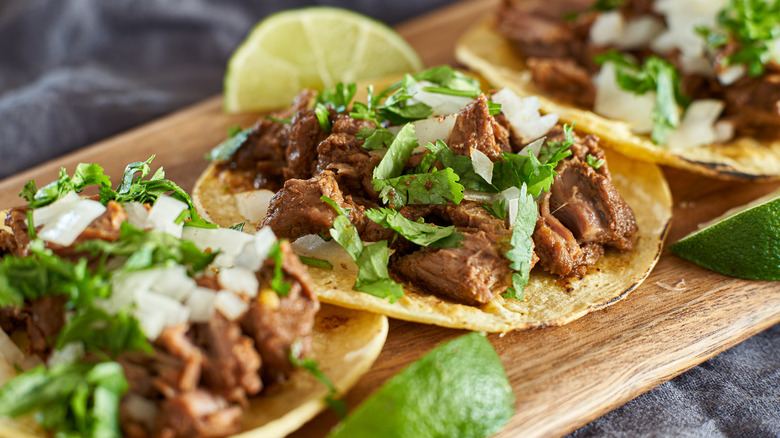The Biggest Mexican Food Misconception Most People Have In The US
While Taco Tuesday might be a weekly staple, that alliterative dinner item is only one small example of the diverse, robust, and flavorful conversation surrounding Mexican cuisine. Chef Roberto Santibañez wants to debunk those Mexican food misconceptions. And it starts by sitting down at the table and picking up a fork.
During a conversation with chef Santibañez, Daily Meal learned his true feelings about Mexican cuisine in the U.S. Even though the food choices seem to be on every corner, there's more to discover. Santibañez said, "The most prevalent misconception regarding Mexican cuisine in the United States is that it is inexpensive, which it is not. There is a difference between Mexican fast food and traditional Mexican dishes."
As the chef and owner of Fonda restaurants, Santibañez features that sentiment front and center on his menus. These dishes are far from grab, eat, and forget the dish. From the enchiladas topped with Oaxacan black mole to the salsas in his taquitos, the robust, layered flavors stem from passionate exploration of Mexican cuisine. As with the recipes in his cookbook, "Truly Mexican: Essential Recipes and Techniques for Authentic Mexican Cooking," Santibañez invites a Mexican food conversation around the table. Even if that drive-thru Mexican meal is convenient, it may not be a true interpretation of the culinary history behind traditional Mexican dishes.
What is Mexican street cuisine?
When chef Roberto Santibañez wanted to debunk the common Mexican food misconceptions, the knowledgeable culinarian was not necessarily discounting fast food nor Mexican street cuisine. As he told Daily Meal, "Mexican fast food is influenced by street cuisine, originating from street vendors and wayside carts in Mexico."
Thinking about that street cuisine, it's often a quick, easy bite, similar to the many Mexican fast-food choices. Although Mexican street cuisine has a long, varied history, the vendors sell more than just a simple taco or a serving of elote. Even though these handheld foods or quick bites are convenient, the robust flavors bring people back for more.
As seen with Mexico City street vendors, each location tends to feature a specialty. From the slow-roasted barbacoa taco that took hours to develop its flavor to handheld tortas with their endless variety, it's impossible to walk away hungry after strolling the streets. Even though the food is convenient, it is made with care and craft. If U.S. Mexican fast food was born from the street vendor, it might be time to revisit the details in those dishes to find a more deeply rooted connection.
Elevated Mexican cuisine focuses on quality ingredients
While a city might have a plethora of Mexican food options, not every restaurant is created equal. When chef Roberto Santibañez asserted his opinion on Mexican food misconceptions, he encouraged people to sit down at the table and taste the difference. Speaking to elevated Mexican cuisine, Santibañez asserted that "many traditional dishes, on the other hand, are sophisticated and made with premium ingredients. At Fonda, we use the same quality ingredients as any other exceptional restaurant." Looking at his menu, that sentiment is clear. From the high-quality proteins to the ingredient components, each decision has purpose.
Many celebrated Mexican chefs have earned accolades for their takes on their native cuisine. The elevated dishes invite a moment to contemplate the past, present, and future. For example, Mexican chef Elena Reygadas earned top female chef from World's 50 Best Restaurants. Her approach combines reimagining classic Mexican dishes while honoring native ingredients and traditions.
Santibañez, like Reygadas, finds a way to blend old and new through their ingredients. The refined flavors come from respecting the past yet building on the present. From seasonality to quality, giving diners a taste of tradition might be the easiest way to debunk those Mexican food misconceptions.


